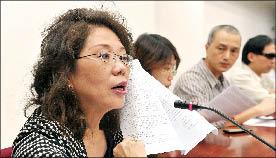About a dozen people from a community college and an animal rights group gathered at the Council of Agriculture yesterday to present a petition urging the council to put an immediate stop to the slaughter of poultry in traditional markets.
Students from Taipei City Wenshan Community College, accompanied by college president Cheng Hsiu-chuan (鄭秀娟), teacher and lawyer Tien Meng-chieh (田蒙潔) and representatives from the Environment and Animal Society of Taiwan (EAST), asked the council to explain why a proclamation prohibiting the slaughter of poultry in traditional markets that was to be announced in April 2008 was first postponed and finally abandoned last year.
EAST executive director Wu Hung (朱增宏) said the Executive Yuan announced a policy -prohibiting all poultry slaughter and selling of live poultry in traditional markets in August 2006 — a policy that should have come into force in April 2008 and for which related government agencies had planned supporting budgets.

Photo: CNA
However, the council postponed the implementation of the policy in 2008 for another two years, saying preparations had been insufficient, Wu said.
The council then changed its policy last year by announcing that poultry could be slaughtered at registered market stands, he said.
The advocates said the prohibition related not just to animal welfare, but was also a way of preventing the spread of avian influenza and ensuring sanitary conditions.
Tien said the new proclamation violated the Animal Industry Act (畜牧法) and the Communicable Disease Control Act (傳染病防治法), and that according to the Administrative Procedure Act (行政程序法), when a proclamation is in violation of the law, it should be invalidated.
Peng Ming-hsing (彭明興), deputy director of the Meat Inspection Division at the council’s Bureau of Animal and Plant Health Inspection and Quarantine, accepted the petition and promised to make a formal response within a month.
Responding to a student question as to why prohibition could not be enforced, Peng said the council had considered many elements, including the receding risks of an epidemic, traditional customs favoring fresh native chicken meat and the fact that certain big cities, such as New York City, still allow the slaughter of fresh poultry.
Council data from last year show there are 62 registered poultry slaughterhouses in Taiwan, which handle about 120 million chickens every year.
Moreover, the council provided subsidies of NT$4.18 million (US$138,000) to 13 slaughterhouses from 2002 to 2004 and NT$216 million to 22 slaughterhouses from 2006 and 2007.
The council has made an effort to support the establishment of legal slaughterhouses and conducted regular examinations on the more than 1,000 registered poultry slaughter stands to ensure the strictest sanitary standards were maintained, Peng said.
He added that there had been a clear change in consumer preferences because the number of registered stands had dropped to 1,163 in September, or 523 stands less than in May.
The animal rights advocates said they would consider taking legal action if the formal response from the council failed to address their concerns.

A magnitude 4.9 earthquake struck off Tainan at 11:47am today, the Central Weather Administration (CWA) said. The hypocenter was 32.3km northeast of Tainan City Hall at a depth of 7.3km, CWA data showed. The intensity of the quake, which gauges the actual effect of a seismic event, measured 4 in Tainan and Chiayi County on Taiwan's seven-tier intensity scale, the data showed. The quake had an intensity of 3 in Chiayi City and County, and Yunlin County, while it was measured as 2 in Kaohsiung, Nantou County, Changhua County, Taitung County and offshore Penghu County, the data showed. There were no immediate reports of

‘DENIAL DEFENSE’: The US would increase its military presence with uncrewed ships, and submarines, while boosting defense in the Indo-Pacific, a Pete Hegseth memo said The US is reorienting its military strategy to focus primarily on deterring a potential Chinese invasion of Taiwan, a memo signed by US Secretary of Defense Pete Hegseth showed. The memo also called on Taiwan to increase its defense spending. The document, known as the “Interim National Defense Strategic Guidance,” was distributed this month and detailed the national defense plans of US President Donald Trump’s administration, an article in the Washington Post said on Saturday. It outlines how the US can prepare for a potential war with China and defend itself from threats in the “near abroad,” including Greenland and the Panama

The Chinese Nationalist Party (KMT) is maintaining close ties with Beijing, the Democratic Progressive Party (DPP) said yesterday, hours after a new round of Chinese military drills in the Taiwan Strait began. Political parties in a democracy have a responsibility to be loyal to the nation and defend its sovereignty, DPP spokesman Justin Wu (吳崢) told a news conference in Taipei. His comments came hours after Beijing announced via Chinese state media that the Chinese People’s Liberation Army’s Eastern Theater Command was holding large-scale drills simulating a multi-pronged attack on Taiwan. Contrary to the KMT’s claims that it is staunchly anti-communist, KMT Deputy

RESPONSE: The government would investigate incidents of Taiwanese entertainers in China promoting CCP propaganda online in contravention of the law, the source said Taiwanese entertainers living in China who are found to have contravened cross-strait regulations or collaborated with the Chinese Communist Party (CCP) could be subject to fines, a source said on Sunday. Several Taiwanese entertainers have posted on the social media platform Sina Weibo saying that Taiwan “must be returned” to China, and sharing news articles from Chinese state media. In response, the Mainland Affairs Council (MAC) has asked the Ministry of Culture to investigate whether the entertainers had contravened any laws, and asked for them to be questioned upon their return to Taiwan, an official familiar with the matter said. To curb repeated